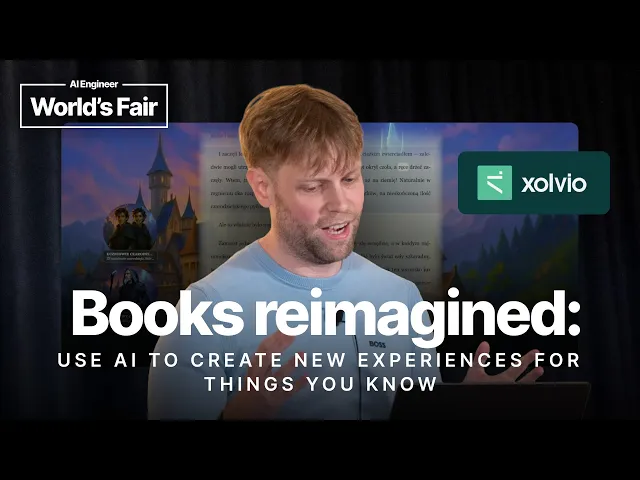Books reimagined: use AI to create new experiences for things you know

Reimagining books with AI: untapped business potential
In an era where digital transformation touches every aspect of our lives, books—those enduring repositories of human knowledge and creativity—have remained largely unchanged in their fundamental form. Lukasz Gandecki's presentation on reimagining books through AI opens a fascinating window into how artificial intelligence could revolutionize our relationship with written content. His vision goes far beyond simple digitization, suggesting instead a complete rethinking of how we interact with and extract value from books in the age of AI.
Key Points
- Traditional books represent untapped potential for AI transformation—they contain structured knowledge that could be unlocked in new, interactive ways rather than remaining static text
- AI can convert passive reading experiences into dynamic conversations with book content, allowing readers to query information, explore tangents, and personalize their learning journey
- The technology stack for book reimagination already exists, combining large language models, retrieval augmented generation (RAG), and vector embeddings to create responsive knowledge systems based on book content
Expert Analysis
The most compelling insight from Gandecki's presentation is the concept of "books as APIs"—treating books not as static products but as interactive services that respond to user queries and adapt to individual needs. This represents a fundamental shift in how we conceptualize books, moving from consumption objects to dynamic knowledge interfaces.
This matters tremendously in our current business landscape where personalization and just-in-time knowledge access drive competitive advantage. As organizations struggle with information overload, the ability to quickly extract relevant insights from trusted sources like books—without reading them cover to cover—could dramatically accelerate learning cycles and decision-making processes. For publishers and content creators, this approach opens entirely new revenue models beyond one-time purchases, potentially transforming books into subscription-based knowledge services with ongoing value.
Beyond the Presentation: Additional Perspectives
While Gandecki outlines an exciting vision, he doesn't fully address the significant copyright and economic challenges this transformation presents. Traditional publishing relies on controlling access to content, with revenues flowing from unit sales. Converting books to AI-powered knowledge systems disrupts this model entirely. Some forward-thinking publishers like O'Reilly Media have already experimented with subscription-based digital libraries that incorporate some interactive features, but full AI integration requires rethinking rights management and compensation structures for authors.
The education sector represents
Recent Videos
How To Earn MONEY With Images (No Bullsh*t)
Smart earnings from your image collection In today's digital economy, passive income streams have become increasingly accessible to creators with various skill sets. A recent YouTube video cuts through the hype to explore legitimate ways photographers, designers, and even casual smartphone users can monetize their image collections. The strategies outlined don't rely on unrealistic promises or complicated schemes—instead, they focus on established marketplaces with proven revenue potential for image creators. Key Points Stock photography platforms like Shutterstock, Adobe Stock, and Getty Images remain viable income sources when you understand their specific requirements and optimize your submissions accordingly. Specialized marketplaces focusing...
Oct 3, 2025New SHAPE SHIFTING AI Robot Is Freaking People Out
Liquid robots will change everything In the quiet labs of Carnegie Mellon University, scientists have created something that feels plucked from science fiction—a magnetic slime robot that can transform between liquid and solid states, slipping through tight spaces before reassembling on the other side. This technology, showcased in a recent YouTube video, represents a significant leap beyond traditional robotics into a realm where machines mimic not just animal movements, but their fundamental physical properties. While the internet might be buzzing with dystopian concerns about "shape-shifting terminators," the reality offers far more promising applications that could revolutionize medicine, rescue operations, and...
Oct 3, 2025How To Do Homeless AI Tiktok Trend (Tiktok Homeless AI Tutorial)
AI homeless trend raises ethical concerns In an era where social media trends evolve faster than we can comprehend them, TikTok's "homeless AI" trend has sparked both creative engagement and serious ethical questions. The trend, which involves using AI to transform ordinary photos into images depicting homelessness, has rapidly gained traction across the platform, with creators eagerly jumping on board to showcase their digital transformations. While the technical process is relatively straightforward, the implications of digitally "becoming homeless" for entertainment deserve careful consideration. The video tutorial provides a step-by-step guide on creating these AI-generated images, explaining how users can transform...
